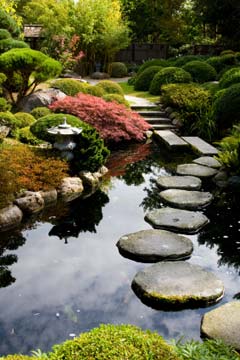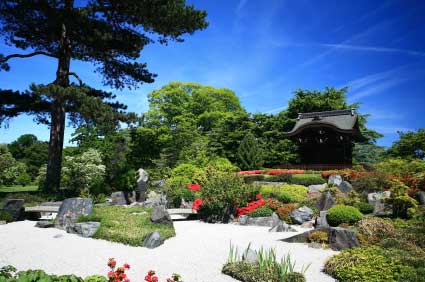Planting a garden in Japanese style is becoming more popular way to style a
garden. History and
the elements of a Zen garden are fascinating.
The Zen Garden originated in the Far East in the country of Japan. The
first Zen gardens were perfected and landscaped by Japanese Samurai warriors
who were Zen Buddhists.
Their faith dictated that the way to enlightenment was through a simple and humble life.
Their faith dictated that the way to enlightenment was through a simple and humble life.
The gardens were developed by Zen Buddhist priests, who are trying to demonstrate the form of landscaping, an example of humility, while demonstrating the power of nature.
An essential factor in any Zen garden is the concept of "yin and yang."
Buddhists see them as complementary forces and any Zen garden always contains an element of yin and yang, although crucial to achieve a balance between the two.
In any Zen garden landscape most important elements are natural stones, sand, water and plants.
Stones
form the most important element in any Zen garden. They
are part of Young and has strict rules for their size and shape.
They are also representative of the islands and mountains, and they are characterized by age and size. Stones, which are vertical or horizontal are used in the design of the Zen garden and is usually between three and five are used.
Contrasting with Ian Stone, sand is Yin. Gravel can be used as an alternative to sand. And it can be light or dark, yin and yang represent elements gravel.
They are also representative of the islands and mountains, and they are characterized by age and size. Stones, which are vertical or horizontal are used in the design of the Zen garden and is usually between three and five are used.
Contrasting with Ian Stone, sand is Yin. Gravel can be used as an alternative to sand. And it can be light or dark, yin and yang represent elements gravel.
The use of plants adds air aestheticity Zen garden. Pine trees are easily grown and are an integral part of many Zen gardens. Although invasive bamboo trees also fit in perfectly with any garden design.
Humid climate also allows for the use of moss. And the plant used to represent the circle of life in Zen Garden Design is a Japanese maple.
Water is believed to create an atmosphere of positive energy in Zen gardens, so it is always included in the design. This is often seen flowing waterfalls and a garden Yin aspect.
There are plenty of open space free of clutter, in the Zen garden, since it is designed to encourage the flow of positive energy.
Zen gardens have become a "must have" acquisition in the western world. They fit into the current Western thinking as environmentally friendly, healthy places to visit and are easy to maintain.
They are also great places to relax physically, mentally and spiritually. A miniature version of Zen gardens - small garden Zen - can be created in a box and placed in high stress environments such as offices.




